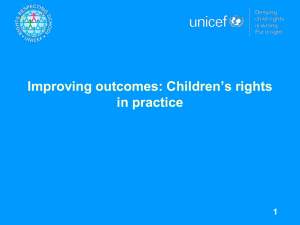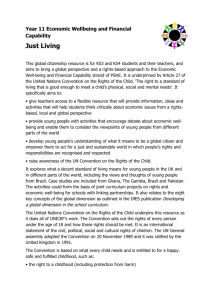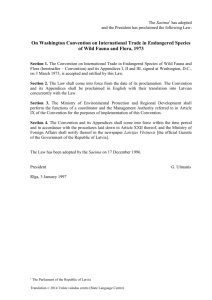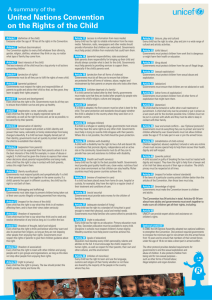UN Convention on the Rights of the Child
advertisement
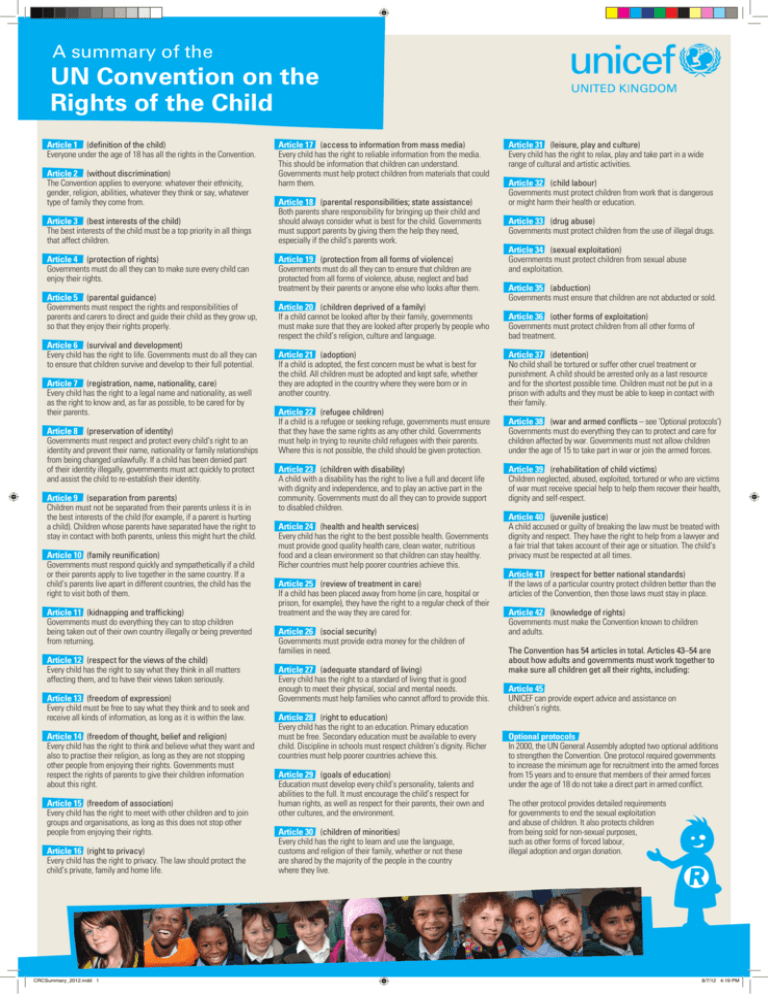
existing A summary of the UN Convention on the Rights of the Child Article 1 (definition of the child) Everyone under the age of 18 has all the rights in the Convention. Article 2 (without discrimination) The Convention applies to everyone: whatever their ethnicity, gender, religion, abilities, whatever they think or say, whatever type of family they come from. Article 3 (best interests of the child) The best interests of the child must be a top priority in all things that affect children. Article 4 (protection of rights) Governments must do all they can to make sure every child can enjoy their rights. Article 5 (parental guidance) Governments must respect the rights and responsibilities of parents and carers to direct and guide their child as they grow up, so that they enjoy their rights properly. Article 6 (survival and development) Every child has the right to life. Governments must do all they can to ensure that children survive and develop to their full potential. Article 7 (registration, name, nationality, care) Every child has the right to a legal name and nationality, as well as the right to know and, as far as possible, to be cared for by their parents. Article 8 (preservation of identity) Governments must respect and protect every child’s right to an identity and prevent their name, nationality or family relationships from being changed unlawfully. If a child has been denied part of their identity illegally, governments must act quickly to protect and assist the child to re-establish their identity. Article 9 (separation from parents) Children must not be separated from their parents unless it is in the best interests of the child (for example, if a parent is hurting a child). Children whose parents have separated have the right to stay in contact with both parents, unless this might hurt the child. Article 10 (family reunification) Governments must respond quickly and sympathetically if a child or their parents apply to live together in the same country. If a child’s parents live apart in different countries, the child has the right to visit both of them. Article 11 (kidnapping and trafficking) Governments must do everything they can to stop children being taken out of their own country illegally or being prevented from returning. Article 12 (respect for the views of the child) Every child has the right to say what they think in all matters affecting them, and to have their views taken seriously. Article 13 (freedom of expression) Every child must be free to say what they think and to seek and receive all kinds of information, as long as it is within the law. Article 14 (freedom of thought, belief and religion) Every child has the right to think and believe what they want and also to practise their religion, as long as they are not stopping other people from enjoying their rights. Governments must respect the rights of parents to give their children information about this right. Article 15 (freedom of association) Every child has the right to meet with other children and to join groups and organisations, as long as this does not stop other people from enjoying their rights. Article 16 (right to privacy) Every child has the right to privacy. The law should protect the child’s private, family and home life. CRCSummary_2012.indd 1 Article 17 (access to information from mass media) Every child has the right to reliable information from the media. This should be information that children can understand. Governments must help protect children from materials that could harm them. Article 18 (parental responsibilities; state assistance) Both parents share responsibility for bringing up their child and should always consider what is best for the child. Governments must support parents by giving them the help they need, especially if the child’s parents work. Article 19 (protection from all forms of violence) Governments must do all they can to ensure that children are protected from all forms of violence, abuse, neglect and bad treatment by their parents or anyone else who looks after them. Article 20 (children deprived of a family) If a child cannot be looked after by their family, governments must make sure that they are looked after properly by people who respect the child’s religion, culture and language. Article 21 (adoption) If a child is adopted, the first concern must be what is best for the child. All children must be adopted and kept safe, whether they are adopted in the country where they were born or in another country. Article 22 (refugee children) If a child is a refugee or seeking refuge, governments must ensure that they have the same rights as any other child. Governments must help in trying to reunite child refugees with their parents. Where this is not possible, the child should be given protection. Article 23 (children with disability) A child with a disability has the right to live a full and decent life with dignity and independence, and to play an active part in the community. Governments must do all they can to provide support to disabled children. Article 24 (health and health services) Every child has the right to the best possible health. Governments must provide good quality health care, clean water, nutritious food and a clean environment so that children can stay healthy. Richer countries must help poorer countries achieve this. Article 25 (review of treatment in care) If a child has been placed away from home (in care, hospital or prison, for example), they have the right to a regular check of their treatment and the way they are cared for. Article 26 (social security) Governments must provide extra money for the children of families in need. Article 27 (adequate standard of living) Every child has the right to a standard of living that is good enough to meet their physical, social and mental needs. Governments must help families who cannot afford to provide this. Article 28 (right to education) Every child has the right to an education. Primary education must be free. Secondary education must be available to every child. Discipline in schools must respect children’s dignity. Richer countries must help poorer countries achieve this. Article 29 (goals of education) Education must develop every child’s personality, talents and abilities to the full. It must encourage the child’s respect for human rights, as well as respect for their parents, their own and other cultures, and the environment. Article 30 (children of minorities) Every child has the right to learn and use the language, customs and religion of their family, whether or not these are shared by the majority of the people in the country where they live. Article 31 (leisure, play and culture) Every child has the right to relax, play and take part in a wide range of cultural and artistic activities. Article 32 (child labour) Governments must protect children from work that is dangerous or might harm their health or education. Article 33 (drug abuse) Governments must protect children from the use of illegal drugs. Article 34 (sexual exploitation) Governments must protect children from sexual abuse and exploitation. Article 35 (abduction) Governments must ensure that children are not abducted or sold. Article 36 (other forms of exploitation) Governments must protect children from all other forms of bad treatment. Article 37 (detention) No child shall be tortured or suffer other cruel treatment or punishment. A child should be arrested only as a last resource and for the shortest possible time. Children must not be put in a prison with adults and they must be able to keep in contact with their family. Article 38 (war and armed conflicts – see ‘Optional protocols’) Governments must do everything they can to protect and care for children affected by war. Governments must not allow children under the age of 15 to take part in war or join the armed forces. Article 39 (rehabilitation of child victims) Children neglected, abused, exploited, tortured or who are victims of war must receive special help to help them recover their health, dignity and self-respect. Article 40 (juvenile justice) A child accused or guilty of breaking the law must be treated with dignity and respect. They have the right to help from a lawyer and a fair trial that takes account of their age or situation. The child’s privacy must be respected at all times. Article 41 (respect for better national standards) If the laws of a particular country protect children better than the articles of the Convention, then those laws must stay in place. Article 42 (knowledge of rights) Governments must make the Convention known to children and adults. The Convention has 54 articles in total. Articles 43–54 are about how adults and governments must work together to make sure all children get all their rights, including: Article 45 UNICEF can provide expert advice and assistance on children’s rights. Optional protocols In 2000, the UN General Assembly adopted two optional additions to strengthen the Convention. One protocol required governments to increase the minimum age for recruitment into the armed forces from 15 years and to ensure that members of their armed forces under the age of 18 do not take a direct part in armed conflict. The other protocol provides detailed requirements for governments to end the sexual exploitation and abuse of children. It also protects children from being sold for non-sexual purposes, such as other forms of forced labour, illegal adoption and organ donation. 8/7/12 4:19 PM Produced in consultation with young people All images © UNICEF UK/2009/Howard Davies UNICEF UK, Registered Charity No. 1072612 Printed on 100 per cent recycled paper unicef.org.uk Article 42 (knowledge of rights) – Governments must make the Convention known to children and adults. We receive no funding from the UN budget. Most of our money comes from people, companies and other bodies. Governments in the countries where UNICEF works also provide money and the people work in partnership with us. We help build a better world for children. Our focus is children who need the most help. We also help when emergencies, such as earthquakes and wars, affect children. The UN Convention on the Rights of the Child is the most widely ratified human rights treaty in history. It was adopted by the UN General Assembly in 1989 and ratified by the UK in 1991. For further copies of this leaflet, please go online unicef.org.uk/32910 or call the UNICEF Education Order Line on 0844 801 2413 quoting code 32910P. This is a summary version of the UN Convention on the Rights of the Child. For the full text, please visit unicef.org.uk/crc Teachers can access classroom resources about children’s rights at unicef.org.uk/education UNICEF works with families, local communities, partners and governments in more than 190 countries to help every child survive and thrive. The UN Convention on the Rights of the Child guides all our work. Find out more about UNICEF UK’s Rights Respecting School Award unicef.org.uk/rrsa UNICEF is the world’s leading organisation working for children and their rights. UN Convention on the Rights of the Child A summary of the Find out about our schools’ fundraising initiative at dayforchange.org.uk A BETTER LIFE FOR EVERYONE existing existing R R WHAT IS THE UN CONVENTION ON THE RIGHTS OF THE CHILD? The UN Convention on the Rights of the Child sets out the rights of every person under 18 and how those rights should be met. It is an international statement of the civil, political, economic, social and cultural rights of children. The UN General Assembly adopted the Convention on 20 November 1989 and it was ratified by the United Kingdom in 1991. UNICEF is the only organisation (other than the UN itself) whose name appears in the Convention. The principles and values of the Convention underpin all our work. THE ROLE OF CHILDREN AND YOUNG PEOPLE In order to enjoy their rights fully as they grow and develop, all children and young people will: • learn about the Convention and how it applies equally to every child and young person around the world. • make the most of their opportunities to fulfil their rights to an education, to be safe, to be healthy, to be treated fairly, and to have a voice in decisions that affect them, and to encourage others to do the same. • do what they can to act in ways that will enable other children and young people, locally and globally, to enjoy their rights. THE CONVENTION AND THE ROLE OF ADULTS The rights set out in the Convention and summarised over the page imply a duty on adults to ensure that these rights are realised. If all children and young people are to fulfil their potential and learn in rights-respecting environments, then adults have a responsibility to model rights-respecting behaviour: • The government and its departments (including local authorities and schools) need to make the Convention known to all children, young people, parents, carers and the community as a whole. • Everyone working with children and young people needs to be fully aware of the Convention and ensure that it informs their policies and underpins their practice. • Parents and carers are responsible for ensuring that they model rights-respecting behaviour in bringing up their children. • Schools are responsible for promoting a rights-respecting environment and for developing an understanding that rights apply equally to everyone globally. • Children and young people should be given opportunities to learn about the wider world and understand how they can act to ensure everyone can fulfil their rights. CRCSummary_2012.indd 2 WHAT IS THE RIGHTS RESPECTING SCHOOL AWARD? UNICEF UK’s Rights Respecting School Award (RRSA) recognises achievement in putting the Convention at the heart of a school’s ethos. The RRSA standards cover four key areas: • Leading and managing a rights-respecting school. • Teaching and learning about the Convention. • Creating and maintaining a rights-respecting ethos. R RR R • Empowering children and young people to become active citizens and learners. The Award scheme is an effective way of inspiring and supporting schools who want to provide children, young people and the wider school community with a rights-respecting guide to living. It also provides a framework to connect a range of school initiatives that are intended to promote the rights of children and young people. 8/7/12 4:19 PM
